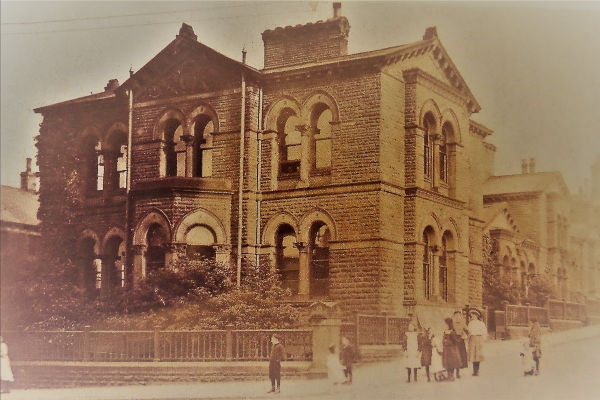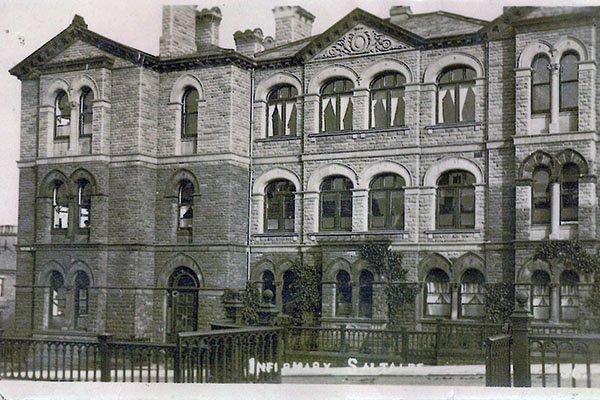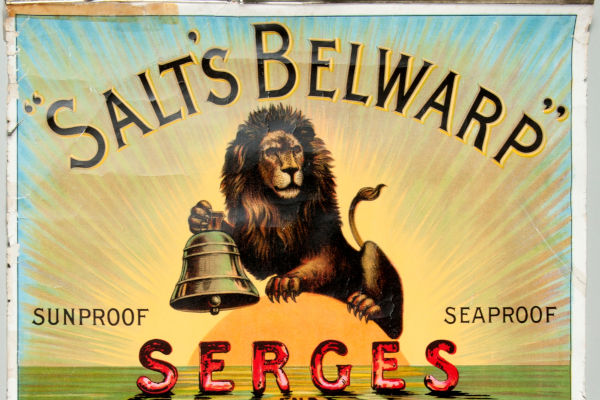Sir Titus Salt’s Hospital in Saltaire served the public for over 100 years. During World War One it cared for wounded soldiers. The great concerns of the war were put to one side for a while by the turmoil caused by the purchase of a bottle of rum for use in the Christmas pudding.
The shocking case of a bottle of rum
During the Great War, Sir Titus Salt’s Hospital operated as an Auxiliary War Hospital receiving soldiers for convalescence who had been wounded in action. While the hospital received funds to meet associated medical costs there was no provision for the soldiers’ non-medical needs. The Sir Titus Salt’s Hospital Board set up a Ladies’ Committee for Soldiers’ Comforts to raise funds through subscriptions, donations and organised events. The Committee also decided how the money raised, known as the Comfort Fund, should be spent.
The Sir Titus Salt’s Hospital Board met monthly and its proceedings were reported on regularly in The Shipley Times and Express. In December 2016 the paper reported that at the recent Board meeting there had been heated debate about the ‘unauthorised‘ purchase of rum for the Christmas pudding.
Miss Dunn, a Board member and a member of the Ladies’ Committee, reported that whilst the Ladies’ Committee had decided against providing a bottle of rum for the hospital Christmas lunch, one had in fact been purchased.
It had long been a tradition at the hospital that a bottle of rum was bought at Christmas so that the patients could have a drop of rum on their Christmas pudding. Therefore, the Matron, Hannah Mitchell, on receiving a gift of £2 from the Committee ‘to spend as she thought fit’ purchased a bottle of rum being unaware of the discussions that had taken place at the Ladies’ Committee.
Rum…blings in the hospital committee
Councillor Learoyd, a Board member stressed it was a ‘matter of principle’ and if the Ladies’ Committee had agreed not to supply rum, the officials of the hospital had no right to over-ride that decision.
‘But you would not spoil the Christmas dinner, would you?’ retorted Mr Baumann, another Board member.
Councillor Learoyd replied that it made no difference to the principle involved whether the puddings were spoiled or not. When members of a committee had spent time voluntarily in considering a question, their decision ought to be respected. When it was argued that doubtless the Matron had thought that the committee had probably overlooked the matter of the rum, Councillor Learoyd retorted: ‘She is not paid for thinking in that way. She is paid for doing as she is told’.
There were tense exchanges, Councillor Learoyd threatened to resign and challenged the Board to move a vote to censure the Ladies’ Committee. In the event, however, it was agreed to invite the Matron to ‘discuss the question’. There is no report on the substance of this discussion.
Rum…blings in the press
Subsequently editorials appeared in the press, stating that the discussions at the Board arose from a misunderstanding, together with a letter from the Chair of the Board exonerating the Matron.
But the matter would not go away and numerous letters appeared in the local press throughout January 1917 under the headings, to cite a view: ‘Absolute Piffle’; ‘A “Saucy” Enemy’; ‘The Limit of Flapdoodle’; ‘Tommy and his Rum’; ‘A “Rum” Answer to a ‘Rum’ Question’.
At the time there was a national debate raging about whether the practice of soldiers receiving daily rations of rum was a harmless comfort or in fact adversely affected their ability to operate effectively. The question of rum for the plum pudding at the hospital therefore provided a platform for local people to vent their strong feelings about this issue.
On 12 January 1917, The Shipley Times and Express published a letter it had received from the Shipley Tent of the Independent Order of Rechabites, enclosing a copy of a resolution which had been unanimously adopted:
That, we, the members of the Shipley Tent I.O.R, protest against the use of intoxicants at Saltaire Infirmary, either as beverages or in connection with food stuffs, as their use is at all times fraught with danger to whoever partakes of them. And especially at this period, when wounded soldiers are among the inmates of that institution. It is advisable that temptation should not be put in the way, and that, too, in contradiction to the wishes of the sub-committee of the Board of Governors.
The issue was taken up most vocally in the local press by Mr Thomas B Knox who, citing the late Lord Kitchener, argued that not only should soldiers avoid alcohol at all times but also that it was illegal for any vendor of intoxicants to supply soldiers in army uniform.
All honour to the Ladies’ Committee for their effort to combat what the present Premier recently characterised as an enemy of the nation, when he said that we are fighting Germany, Austria and the drink traffic.
This was rebutted by others.
To common sense people …Mr Thomas B Knox strikes one as making mountains out of molehills and the mountains are poor stuff….What its ‘pernicious effects’ are, or what ‘danger it is fraught with’ at a teaspoonful per man is about the limit of exaggerated flapdoodle.
The end of the rum question
So it went on throughout January. But the final say went to the soldiers themselves:
Is it such a great crime for us “mere boys”(Miss Dunn had called them mere boys much to the annoyance of the soldiers) to have such a large amount of rum – about a teaspoonful in every helping of pudding? In my opinion it is “piffle” to make so much fuss over a paltry thing like this after having led lives we mere boys have led out there. We may be a lot of little children instead of men but we have stared death in the face more than once. I think our Matron is quite capable of looking after us, and to a man we stick to her as we stuck to the guns at the front” In my opinion it is ‘piffle’ to make so much fuss over a paltry thing like this…I think our Matron is quite capable of looking after us, and to a man we stick to her as we stuck to the guns at the front
Or
On reading the Shipley Times dated 12 January I see the war on rum still continues and it may be interesting to know that we mere boys are standing to again. There has been a slight attack from the direction of Shipley by members of some order who has not had Somme. That has failed miserably from the letters published on our side and we are winning the round. I think neutrals had better remain neutral or join our side. That bottle of rum must certainly have been strong as it has made many people talk. Signed ‘One of the Rum Brigade’
The final entry in the press was on 31 January 2017 reporting on the Board meeting held the previous Wednesday. The question of the purchase of rum was again raised. The Chair requested that such discussions be held after the Press had withdrawn but Miss Dunn interposed that before the Press withdrew, she wanted it publicly known that she intended to tender her resignation as a member of the Committee.
Everyone had their say on why they did or didn’t support the Matron or the purchasing of rum or what had or hadn’t been said in the press but in the end, it was all put down to misunderstandings and Miss Dunn was persuaded to withdraw her resignation.
Words by our volunteer writer, Caroline Perry. Based on research by local historian Colin Coates on the Sir Titus Salt’s Hospital, and on information from the British Newspaper Archive.


